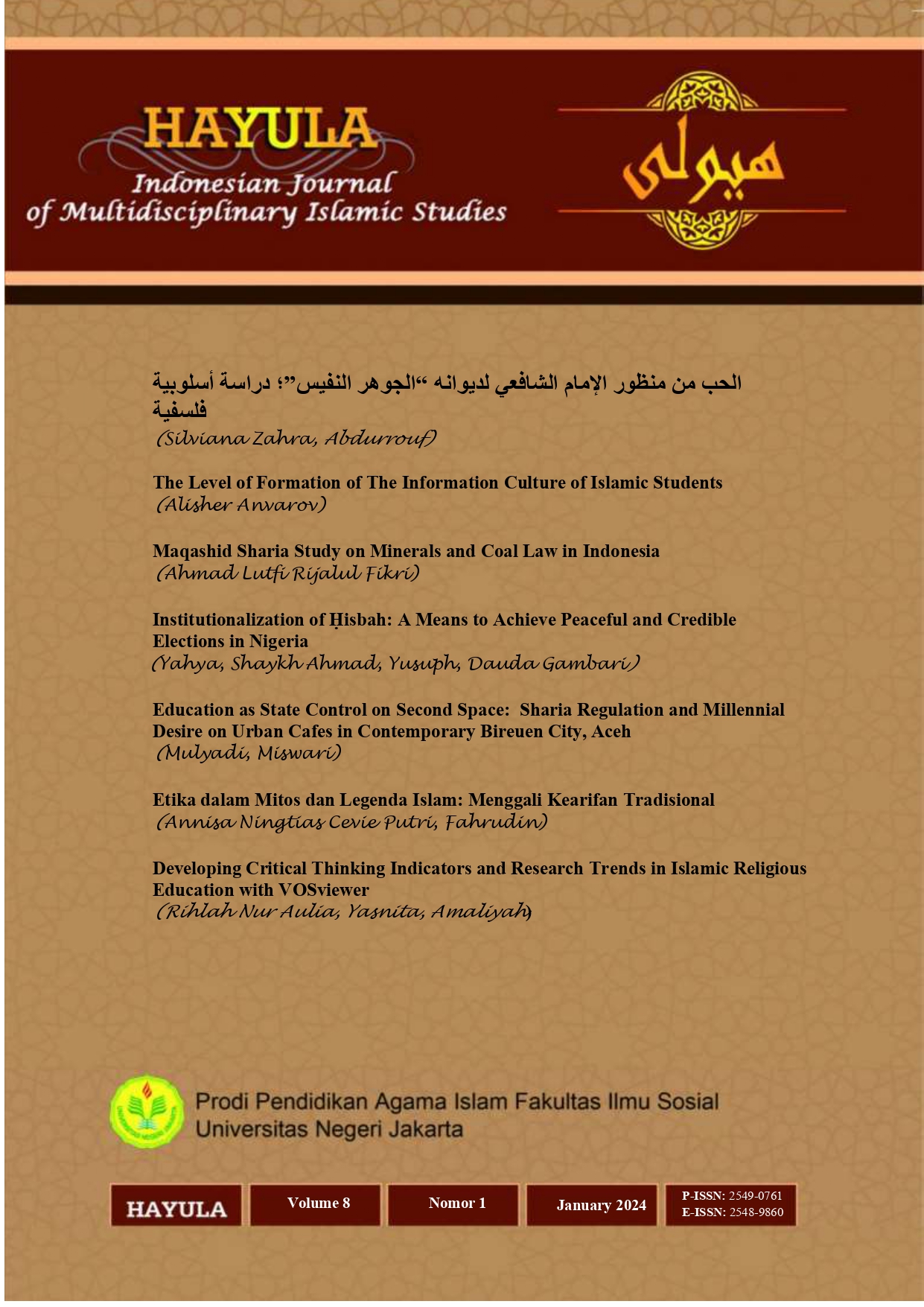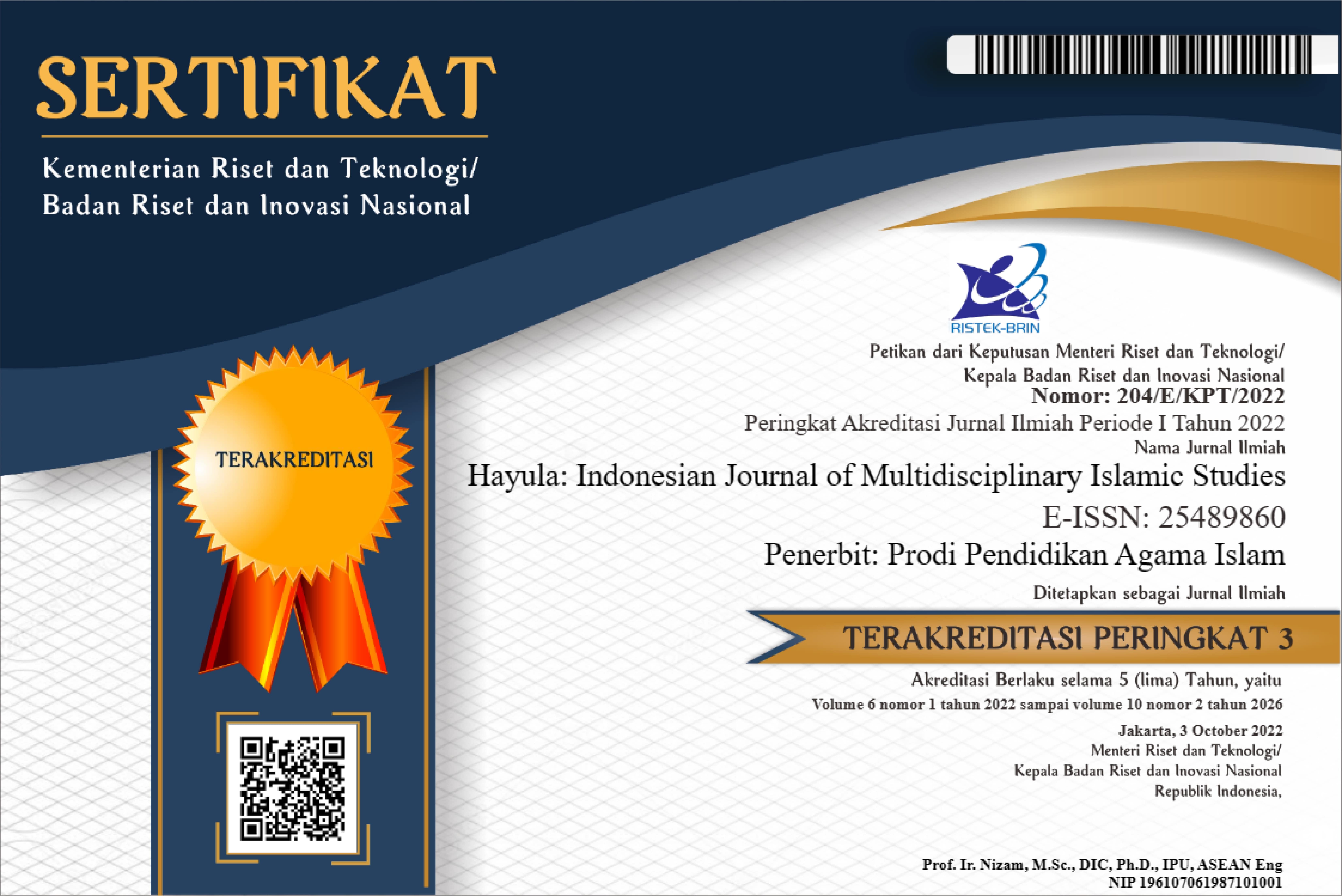The Level of Formation of The Information Culture of Islamic Students
DOI:
https://doi.org/10.21009/hayula.008.01.02Keywords:
Information Culture, Islamic Education InstitutionsAbstract
This article explains what information culture is and its specific features in the era of modern information culture. Fast and high-quality circulation of information is needed in the educational system and is an important factor or aspect for the progress and development of a country. Therefore, it is important for students and the younger generation to implement the basic criteria of information culture in the proper use of the Internet in education. The research problem is to determine the social factors that lead to the lack of a critical approach to the selection of necessary information among students in Islamic educational institutions. This research is important because information culture is a vital need for future preachers or preachers. The research method uses a literature review approach. The focus of the research is to analyze the patterns of using information culture on the Internet and social media. The results of the study provide an explanation of the patterns of information use in society, especially in Islamic educational institutions. The results describe 13 key factors on the level of formation of students' information culture in Islamic education in the 21st century.
Keywords: Information Culture, Islamic Education Institutions
References
A.A. Anvarov. 2016. Role of the DAAD Project in International Collaboration, American Research Institute for Policy Development Journal, 23-24.
A. V. Karpov. (2003). Reflexivity as a mental property and methods of its diagnosis, Psychological Journal. 24 (5), 45-57.
Decree of the President of the Republic of Uzbekistan, https://yuz.uz/news/new-project-of-development-strategy-for-2022-2026-was-put-for-discussion
Decree of the President of the Republic of Uzbekistan dated February 7, 2017, No. PF-4947 “On the strategy of action for the further development of the Republic of Uzbekistan.” 2017, No. 6, Article 70.
F. Zakirova, S. Babajanov. (2020). Development of media competence of the future
teacher. Tashkent, Alokachi. 204, 135-139.
Gendina N.I. (2017) UNESCO Curriculum on Media and Information Literacy for Teachers as an Object of Analysis and Adaptation in Russia And Uzbekistan. // Media education. Media Education. (3) 27–44.
H.A. Turakulov. (2007) Information Systems and Technologies in Pedagogical Research. Tashkent: Science, 248.
https://uz.wikipedia.org › wiki › Subculture
https://dzen.ru/a/XKMu/ My life... My rules
https://www.ziyouz.com/library/National Encyclopedia of Uzbekistan.
https://www.bbc.com //Uzbek/topics//World Health Organization (WHO)
https://xs.uz/uzkr/post/Names of extremist organizations revealed and known.
https://lex.uz/ru/docs/3841963//Article 11. Prohibition of the import, production, storage, distribution and display of extremist materials, Law of the Republic of Uzbekistan “On Combating Extremism”, No. ZRU-489, Tashkent, July 30, 2018, from 2.
1 R. Samarov. (2014) Information Culture and The Theoretical and Practical Significance of Its Formation. Modern Education, 2014, pp. 22-23
Muratova. N. (2019). Media and Information Literacy in Journalism: [Text] / N. Muratova, E. Grizzle, - Tashkent: Bactria Press, 112.
N. Kadyrova “Problems of the Globalization of Information Culture in the Current time” Monograph, published in Riga, Latvia, 25-26. Available in 9 languages and source: www.morebooks.shop
President of the Republic of Uzbekistan Sh.M. (2023) The Priority Tasks. identified by Mirziyoyev in the address of the Supreme Assembly, 11-12.
Yu. Ocheret. (2019). The Formation of Information Culture of The Individual in The Conditions of Information and Library institutions. // Information culture in the context of a new paradigm of education: – Kemerovo: Regional Institute of Education and Science, 59.
Yu. Ocheret. (2019). Formation of Personal Information Culture in The Conditions of Information and Library institutions. // Information culture in the context of a new paradigm: – Kemerovo: Regional Institute of Ural Sciences, 59
Downloads
Published
How to Cite
Issue
Section
License
Authors who publish with this Journal agree to the following terms:
- Author retain copyright and grant the journal right of first publication with the work simultaneously licensed under a creative commons attribution licensethat allow others to share the work within an acknowledgement of the work’s authorship and initial publication of this journal.
- Authors are able to enter into separate, additional contractual arrangementfor the non-exclusive distribution of the journal’s published version of the work (e.g. acknowledgement of its initial publication in this journal).
- Authors are permitted and encouraged to post their work online(e.g. in institutional repositories or on their websites) prior to and during the submission process, as it can lead to productive exchanges, as well as earlier and greater citation of published works.
Users/public use of this website will be licensed to CC BY







